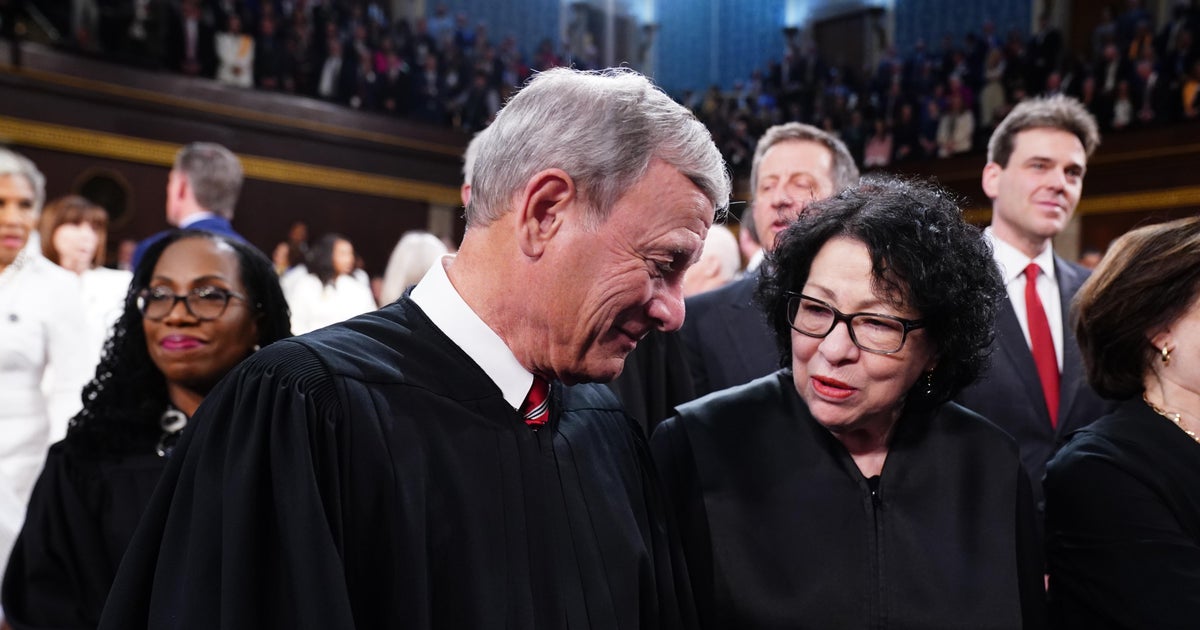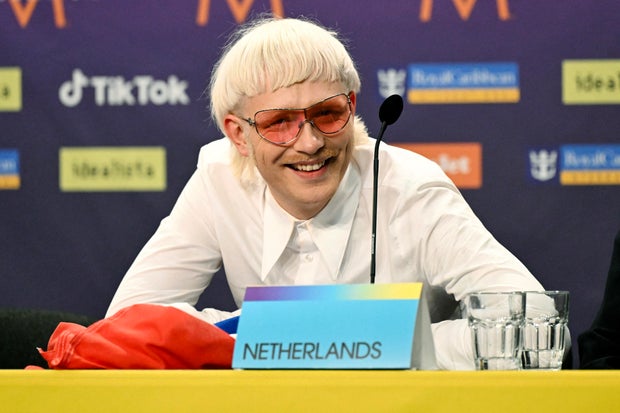CBS News
Dutch contestant Joost Klein kicked out of Eurovision hours before contest final

The Netherlands’ contestant in the Eurovision Song Contest was expelled from competition hours before Saturday’s final of the pan-continental pop competition, which has been rattled by protests over the participation of Israel.
Competition organizer the European Broadcasting Union said Swedish police were investigating “a complaint made by a female member of the production crew” against Dutch performer Joost Klein. The organizer said it wouldn’t be appropriate for Klein to participate at the event while the legal process was underway.
Though Eurovision’s motto is “united by music,” this year’s event has proven divisive. Israel’s participation has attracted large pro-Palestinian demonstrations, with protesters saying the country should be excluded because of its conduct in the war in the Gaza Strip.
Klein, a 26-year-old Dutch singer and rapper, had been a favorite of both bookmakers and fans with his song “Europapa.”
He failed to perform at two dress rehearsals on Friday, and the EBU had said it was investigating an “incident.” Dutch broadcaster AVROTROS, one of dozens of public broadcasters that collectively fund and broadcast the contest, said that as Klein came offstage after Thursday’s semifinal he was filmed without his consent and in turn made a “threatening movement” toward the camera.
The broadcaster said Klein didn’t touch the camera or the female camera operator, and called his expulsion “very heavy and disproportionate” punishment.
Jessica Gow via Getty Images
Some music lovers in the Eurovision fan park expressed dismay at the Dutch expulsion. Sven Sherman from Sweden said it was a “pity that a song which is absolutely made for Europe” is now disqualified.
“I mean, honestly, which country has done so much, many good things for Europe, like the Netherlands? So it’s really a pity and I hope next year they will be back again,” he said.
It all makes for a messy climax to an event that draws both adoration and derision with its campy, kitschy ethos and passion for pop.
Tensions and nerves were palpable in the hours before the final, where 25 acts – narrowed from 37 entrants by two semifinal runoffs – are due to perform three-minute songs in front of a live audience of thousands and an estimated 180 million viewers around the world.
Several artists were absent from the Olympics-style artists’ entrance at the start of the final dress rehearsal, though all but Ireland’s Bambie Thug went on to perform.
The Irish performer issued a statement saying the absence was due to a situation “which I felt needed urgent attention from the EBU” and telling fans: “I hope to see you on the stage later.”
Jens Battner via Getty Images
French singer Slimane cut short his song “Mon Amour” at the dress rehearsal to give a speech urging people to be “united by music, yes – but with love, for peace.”
The offstage drama is overshadowing a competition whose entries range from emotional to eccentric. They include the goofy 1990s nostalgia of Finland’s Windows95man, who emerges from a giant onstage egg wearing very little clothing. Bambie Thug summons witchy spirits onstage and has brought a scream coach to Malmo, while Spain’s Nebulossa boldly reclaims a term used as a slur on women in “Zorra.”
The favorites include Swiss singer Nemo – who would be the first nonbinary Eurovision winner if their operatic song “The Code” tops the voting – and Croatia’s Baby Lasagna. His song “Rim Tim Tagi Dim” is a rollicking rock number that tackles the issue of young Croatians leaving the country in search of a better life.
Dean Vuletic, an expert on the history of the contest, said that despite the contest’s reputation for disposable bubblegum pop, Eurovision often tackles “political and social issues such as feminism, European integration, gender identity.”
Sometimes, though, songs run afoul of the contest’s ban on openly “political” statements. Eurovision organizers told Israel to change the original title of its song, “October Rain” – an apparent reference to the Oct. 7 Hamas attack that killed about 1,200 people in Israel and triggered the war in Gaza.
Israeli singer Eden Golan has shot up the odds since performing the power ballad, now titled “Hurricane,” in Thursday’s semifinal. Golan faced some booing at dress rehearsals, but was voted into the final by viewers around the world.
Jens Battner via Getty Images
Israeli Prime Minister Benjamin Netanyahu praised 20-year-old Golan for performing despite “contending with an ugly wave of antisemitism.”
Pro-Palestinian protesters argue that Israel shouldn’t be allowed to take part amid a war that has killed almost 35,000 Palestinians, according to the health ministry in the Hamas-run territory.
Thousands of people marched for the second time this week on Saturday through Sweden’s third-largest city, which has a large Muslim population, to demand a boycott of Israel and a cease-fire in the seven-month war.
A few Palestinian flags were waved in the auditorium during Saturday’s Eurovision dress rehearsal, in defiance of a ban on flags other than those of competing nations.
The competing musicians are feeling the pressure, inundated with messages and abuse on social media and unable to speak out because of the contest rules. Italy’s contestant, Angelina Mango, made a statement by walking into the Eurovision media center on Friday and performing John Lennon’s “Imagine” as dozens of journalists gathered around her.
Swedish singer Loreen, last year’s Eurovision champion – and one of only two performers to win the contest twice – said world events were “traumatizing” but urged people not to shut down the “community of love” that is Eurovision.
“What heals trauma … Does trauma heal trauma? Does negativity heal negativity? It doesn’t work like that,” she told The Associated Press. “The only thing that heals trauma for real – this is science – is love.”
CBS News
Despite pressure on Sotomayor, Supreme Court unlikely to change before Trump takes office. Here’s why.

Washington — President-elect Donald Trump’s victory Tuesday has stirred up whispers about whether Justice Sonia Sotomayor should step down from the Supreme Court to allow President Biden to nominate a successor before Republicans take control of Washington.
But any changes in the composition of the nation’s highest court are unlikely in the coming months, even as lawmakers return for a lame-duck session to finish their business before Trump is sworn in for a second term and the GOP assumes the Senate majority.
Sotomayor hasn’t responded publicly to the chatter about a retirement, and she did not return a request for comment about her future. She remains an active questioner during oral arguments and has become known for biting dissents in hotly contested cases.
At 70, she is not the oldest member of the Supreme Court — Justice Clarence Thomas is 76 and Justice Samuel Alito is 74 — and she is newly into her tenure as the senior-most member of its liberal wing, a position she assumed following the retirement of Justice Stephen Breyer in 2022.
Sotomayor, the first Hispanic justice, is also a decade younger than Justice Ruth Bader Ginsburg was when she faced pressure to step down from the Supreme Court in 2013 and 2014.
Ginsburg, who was treated for early-stage colon cancer in 1999 and pancreatic cancer in 2009, rejected any suggestion that she retire to allow then-President Barack Obama to name a successor while Democrats had control of the Senate. She remained on the Supreme Court until her death in September 2020, after which Trump, nearing the end of his first term, selected Justice Amy Coney Barrett to fill her seat. Barrett’s confirmation by the GOP-led Senate widened the Supreme Court’s conservative majority to 6-3.
With a second term for Trump on the horizon, and Democrats losing control of the Senate come January, when Republicans will hold at least 52 seats, progressives are fearful of a repeat of what happened with Ginsburg’s seat.
“We have no idea how long it will be until somebody who shares Justice Sotomayor’s jurisprudence, her values will be in a position to be nominated again,” Molly Coleman, executive director of the People’s Parity Project, a progressive judicial group, told CBS News. “Of course we all want to hope for the best, but unfortunately we’ve been left in a position where that’s all we can do.”
The circumstances of more than a decade ago are different from today, making it far from a sure thing that even if Sotomayor were to retire, the Senate would confirm her replacement before the GOP takes over. For one, Democrats currently have a narrow 51-49 majority, which includes the four independent senators who vote with the party.
One of those senators, Joe Manchin of West Virginia, told Politico in March that he would not support nominees who do not have GOP support.
“Just one Republican. That’s all I’m asking for. Give me something bipartisan. This is my own little filibuster. If they can’t get one Republican, I vote for none. I’ve told [Democrats] that. I said, ‘I’m sick and tired of it, I can’t take it anymore,'” Manchin, who is retiring from the Senate, said.
He later appeared to slightly reverse course, voting in September to advance the nomination of a candidate for a federal appeals court. A spokesperson for the senator told Axios at the time that Manchin learned opposition to the nominee was based on how the White House handled the process, not qualifications.
Erwin Chemerinsky, the dean of the University of California Berkeley Law School, said there is not enough time for a successor to be nominated and confirmed by the Senate by early January. Incoming House and Senate members will be sworn in on Jan. 3, and the results of the election will be reaffirmed by Congress on Jan. 6.
“Joe Manchin made clear he would not vote for any nominee without Republican support and no Republican would vote for a Biden nominee to replace Sotomayor. Sotomayor retiring now would likely just give Trump a vacancy to fill. It is totally different from whether Ginsburg should have retired in summer 2014 before the election,” he told CBS News in an email.
Chemerinsky wrote in September 2014 that Ginsburg should have retired that summer and warned her decision not to “could end up hurting her legal legacy.” Democrats had control of the Senate at that time, but lost it following the November 2014 midterm elections.
Even some progressive groups that called for open discussions about Sotomayor’s future on the court months ago are recognizing that the window has closed.
“The reality is it’s too late. It’s too late for Democrats to be having this conversation. It’s too late to be launching a pressure campaign. The ship has sailed,” Coleman, of the People’s Parity Project said.
She said discussions should have happened earlier this year and warned the consequences of waiting may be “catastrophic.”
Instead, liberal judicial advocacy groups are turning their focus to the confirming Mr. Biden’s remaining nominees to the federal district and appeals courts. There are currently 47 open seats on the federal bench, and 17 nominees are awaiting Senate action. There will be another 20 vacancies in the coming weeks, and 11 nominees are pending for those seats.
“Hand wringing about the unknown doesn’t help anyone right now,” said Maggie Jo Buchanan, managing director of the judicial group Demand Justice. “Right now, we are firmly focused on the fact that there are still 30 pending Biden nominees before the Senate that deserve, and need, confirmation. The Senate should be focused on working late, working weekends to get these talented individuals on the bench.”
Trump saw immense success with judicial confirmations during his first term, appointing 234 jurists to the Supreme Court, federal courts of appeals, district courts and U.S. Court of International Trade. But Mr. Biden is closing in on that number, with 213 appointments so far.
CBS News
Beyoncé nominated for 11 Grammys

Watch CBS News
Be the first to know
Get browser notifications for breaking news, live events, and exclusive reporting.
CBS News
Nov 8: CBS News 24/7, 1pm ET

Watch CBS News
Be the first to know
Get browser notifications for breaking news, live events, and exclusive reporting.










